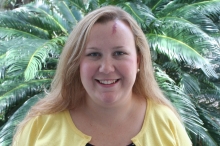
 Monica Owens is being honored as a Champion of Change for her service to the American Red Cross.
Monica Owens is being honored as a Champion of Change for her service to the American Red Cross.
I am truly humbled and honored to receive recognition as a Champion of Change. My first lessons regarding the importance of service to both the nation and local communities came observing my parents. My father is retired from the United States Air Force and my mother has dedicated her life to working in public education, often in very challenging school districts. Both of my parents have been involved in community work around the world especially through faith-based networks. At a young age, I was exposed first hand to the mission of the American Red Cross. In 1994, flooding devastated my hometown of Warner Robins, Georgia. I will never forget helping my extended family members during the recovery process.
After graduating from the University of Georgia with a degree in anthropology, I joined AmeriCorps*National Civilian Community Corps. I wanted to serve to my country by learning more about the basic needs in communities nationwide. I cherished my AmeriCorps experience and returned to serve a second year as a field team leader. During these two terms of service, I worked in four states that had been affected by disasters. I remember the surreal experience of being in the Lower 9th Ward the first day residents were allowed to return home after Hurricane Katrina. I helped residents gut their homes and salvage prized possessions.
Several months later, my team was sent to Gulfport, Mississippi, where I managed volunteers at Westminster Presbyterian Church. I was astounded by their impact in coastal Mississippi and felt compelled to continue helping in the recovery effort. I completed my AmeriCorps commitment and moved to South Mississippi, where I immediately began working in long-term recovery. I became an employee of the American Red Cross Hurricane Recovery Program, serving as a client recovery specialist working with Katrina survivors in their personal recovery process. The experience was both heart wrenching and extremely gratifying. Knowing that all of my clients lived in disaster-prone areas, I encouraged each family to create a personalized family disaster plan.
Red Cross national headquarters assembled a team of employees who were already working on the Hurricane Recovery Program to create and implement a multi-state pilot on community resilience. I was on the team with colleagues from Louisiana, Colorado, California and other locations across the country. We began to survey our individual communities to identify gaps in their preparedness processes. We talked to formal and informal leaders to find out what they considered to be the greatest needs in their community. The Red Cross came in not as an authority, but as a community partner fully committed to working together to serve its neighbors.
Since we started implementing this community resilience strategy more than a year ago, I’ve seen numerous changes. I serve southern Mississippi, which is highly impoverished and vulnerable to natural disasters. It also has a high incidence of family home fires. The community has large Hispanic and Vietnamese populations, which result in language barriers and cultural considerations that challenge our disaster response and community preparedness efforts. With this new strategy, I’ve worked with leaders from all communities to create disaster response plans and make preparedness a cultural norm. For instance, I’ve worked with local firefighters to help them better understand the Hispanic community and worked with the Hispanic community to teach them about the role of firefighters and the importance of smoke detectors. I’ve also coordinated a door-to-door campaign to educate families on where they can get help during emergency evacuations. Because of this campaign, 800 families now have a family disaster plan in place.
As Hurricane Isaac, community network members were calling me to speak to their groups about disaster relief. I was able to contact my Red Cross counterpart in New Orleans for real-time updates on sheltering and other services Red Cross was offering. Moving forward, we’ve received a grant to expand our work with childcare providers to teach them techniques on how to best shelter children during chemical or natural disasters.
My team and I are teaching communities to be self reliant in the face of disasters. Many residents felt helpless when faced with an impending emergency and wouldn’t take the steps needed to stay safe. With every step we take in the strategy, we are providing the community with culturally appropriate solutions for preparedness. There’s no one-size-fits-all answer. By taking the time to listen and learn from the community, we are better able to predict where the need will be greatest and help those who need us most.
Monica Owens is a Community Resilience Coordinator for the Red Cross in South Mississippi, pilot testing a new strategy for the Red Cross to build resilience at the community level by leveraging and connecting community networks


